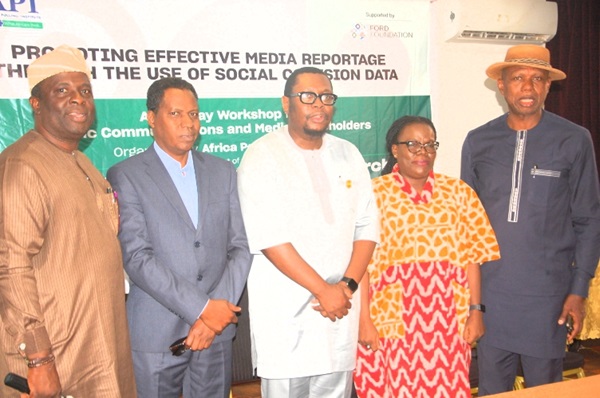
The executive director of the Africa Polling Institute (API), Prof. Bell Ihua has revealed that Nigeria will launch its 2025 Social Cohesion Survey to bridge the persistent gap between data availability and its practical application in fostering national unity, social harmony and long-term stability.
He made this known at a one-day workshop for journalists held in Abuja, themed “Promoting Effective Media Reportage Through the Use of Social Cohesion Data.” The workshop aimed to build the capacity of journalists and media professionals to interpret, contextualise and apply social cohesion data in storytelling and advocacy for peacebuilding and national integration.
Ihua explained that while Nigeria faces deep-rooted social cohesion challenges, ranging from low trust in government to high polarization and poor access to justice, equipping the media with data literacy skills is a strategic step towards shaping narratives that promote unity over division.
According to him, recent findings reveal that Nigerians tend to trust traditional and religious leaders more than governmental institutions, and that access to justice is largely viewed as a privilege reserved for the wealthy and well-connected.
“Our survey findings consistently show that many Nigerians believe that justice is not equally accessible,” Ihua said. “Only the rich and powerful seem able to seek redress, and this perception feeds into wider disillusionment with the state.”
He urged citizens to adopt a mindset that prioritizes national identity over ethnic, regional, or religious affiliations. “We must begin to see ourselves as Nigerians first. It is this shift in orientation that builds bridges of understanding and strengthens social cohesion.”
Prof. Ihua emphasised that data can provide vital insights into issues such as trust, social relations, solidarity, civic participation, and perceptions of national unity. He stated that understanding these dimensions can inform policy decisions, enrich journalism and improve national dialogue.
He noted that the upcoming 2025 survey will be API’s third national report on social cohesion, following earlier editions that helped define key indicators for measuring unity, tolerance, trust, civic responsibility and inclusiveness across the country’s diverse population.
“We present the data in a way that captures people’s attitudes and lived experiences. The goal is to use this data to drive development, peacebuilding, and inclusive governance,” he said.
Dr. Olusoji Adeniyi, a social policy expert and lead facilitator at the workshop, explained that the session was designed to close the gap between data generation and actionable response. He described social cohesion as “the strength of relationships and the sense of solidarity within a society,” stressing its significance for national stability, democratic governance and inclusive development.
“In Nigeria, we have rich datasets and warning systems, but the challenge has been translating that data into meaningful action,” he said. “Journalists, as agenda-setters, must be equipped to use this data in ways that deepen public understanding and shape policy.”
Adeniyi further noted that API’s nationwide surveys have revealed widespread public dissatisfaction and growing divides along religious, ethnic, and political lines, with many stakeholders still unaware of these dynamics or unable to apply them in policymaking or civic programming.
He called for urgent, data-driven interventions to mitigate fragmentation and strengthen national cohesion before these divisions escalate further.
Founder of Akweya TV and media trainer, Odoh Okenyodo advised journalists to approach social cohesion reporting with professionalism, responsibility, and a strong sense of civic duty. He warned that reporting on sensitive identity-related topics comes with inherent risks, particularly in conflict-prone areas.
“Journalists face real threats – from limited access to reliable information, to harassment and the absence of proper insurance or institutional protections,” he said. “But this must not deter you from reporting the truth responsibly. What matters is how we frame our stories and the language we use.”
He urged journalists to avoid sensationalism and instead focus on context, nuance and solutions-based journalism, especially when covering issues that cut across ethnic, religious, or regional lines.
Development expert, Titilope Ojo also addressed participants, reflecting on the difficult balance between editorial independence and media ownership interests. She acknowledged that many journalists work under employers who prioritise political or economic motives over nation-building narratives.
“Despite these challenges, journalists must remain conscious of their responsibility to promote national interest,” she said. “Nationalism is crucial for unity and progress. As media professionals, we have to intentionally push stories that inspire shared values and identity.”
Dr. Obiora Chukwumba, a journalism scholar and analyst, delivered a presentation on the role of media and storytelling in shaping national identity and fostering cohesion. He lamented the declining quality of journalism in Nigeria, citing poor funding and dwindling reach as major factors.
“Many media outlets no longer have the resources to do in-depth or investigative reporting,” he noted. “This affects their ability to tell stories that reflect the diversity of the Nigerian experience or promote unity.”
He called for sustainable business models for media organisations and renewed investments in training and innovation to elevate journalism standards.
Head of mass communication at Baze University, Dr. Hamisu Muhammad delivered a keynote lecture on the interplay between identity, nationalism, and the media. He attributed Nigeria’s sociopolitical challenges to “micro-nationalism” – a trend where ethnic or regional affiliations are prioritised over a shared national identity.
“Media can either be part of the solution or exacerbate the problem,” he said. “It all depends on the editorial choices we make and the values we choose to promote.”
He concluded by highlighting the urgent need for a more inclusive and nuanced media approach – one that recognises Nigeria’s diversity but actively works to bridge differences rather than entrench them.
As Nigeria prepares to launch the 2025 Social Cohesion Survey, API and its partners hope that the insights generated will not only inform government policy but also equip journalists and civic actors to tell stories that unify, heal and build trust.
The event concluded with a call for stronger collaboration between researchers, the media, and civil society to ensure that social cohesion data becomes a tool for peace, justice and national progress.

